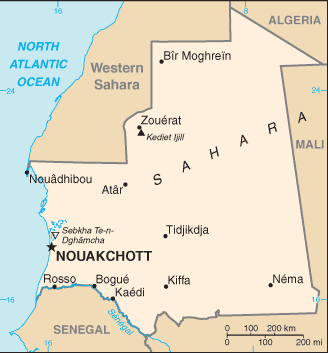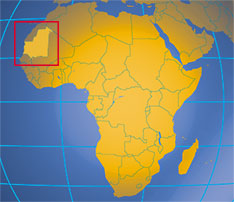 Al Qaeda have claimed responsibility for an attempted overnight attack near n the Mauritanian capital of Nouakchott. Army forces shot at a car containing 1.3 tonnes of explosives killing all three occupants, and injuring eight soldiers in the process. Security forces tracked the vehicle from the border with Mali after a tip-off and made the intercept 12km south of the capital, shelling the car causing a massive explosion.
Al Qaeda have claimed responsibility for an attempted overnight attack near n the Mauritanian capital of Nouakchott. Army forces shot at a car containing 1.3 tonnes of explosives killing all three occupants, and injuring eight soldiers in the process. Security forces tracked the vehicle from the border with Mali after a tip-off and made the intercept 12km south of the capital, shelling the car causing a massive explosion. In a a phone call to an Islamic website, North African Al Qaeda said they were targeting President Mohamed Ould Abdel Aziz. Mauritania’s Defense Minister Hamadi Ould Hamadi said the dead men were plotting an attack on military barracks as well as the French embassy. Security forces had earlier stopped a second car arresting an al-Qaida militant who confessed the plot including the target and the direction of travel.
The group known as Al-Qaida in the Islamic Maghreb has claimed responsibility for several attacks in Mauritania. These include the 2009 killing of 39-year-old American Christopher Ervin Leggett and the 2007 shooting of four French tourists picnicking on the side of a rural road. As a result President Aziz has created specialised army units to deal with AQIM which launched a cross-border raid into northern Mali to destroy an AQIM base last year.
But while Aziz’s vigorous pursuit of Islamists has led to international support, the endorsement is not so ringing at home. Yacoub Ould Dahoud was certainly not a fan. The 41-year-old businessman had been following events in Tunisia closely and decided to carry out his own protest in the manner of Tunisian Mohamed Bouazizi. On 17 January Dahoud set himself alight in front of the presidential palace in Nouakchott. Dahoud’s Facebook message before he set himself on fire read “Enough corruption! Enough injustice in Mauritania! For fifty years we have suffered from corruption and injustice.”
Dahoud wanted an end to army power and the end of duties and taxes on rice, wheat, cooking oil, sugar and dairy products. His message to Aziz was “if you do not accept these demands, you will face the wrath of the People who will come out just like they came out against Ben Ali.” Dahoud said he wanted “our children to live in a country with social justice, freedom and democracy.” After setting himself alight, his family sent him to Morocco for treatment but he died six days later of his wounds. His death fuelled anger in a country that overcame its ancient aversion towards suicide. Mauritania’s Taqadoumy news website showed a growing outrage over a smear campaign launched by the president. Aziz described Dahoud’s action as “desperate because of [General Aziz's] war on corruption as [Dahoud] hails from a wealthy family.”
Aziz has plenty of his own problems to worry about. Prices have soared in recent times, particularly sugar, oil and milk powder. His Government has been casting an anxious glance over its shoulder at Algeria where similar price rises of basic commodities left five people dead and 800 wounded in riots in early January. Through a statement issued by Mauritanian News Agency, Aziz asked his Government to consider urgent action to resolve the problem “Given the evolution of prices of certain foodstuffs, the President instructed the Government to take urgent measures likely to help keep prices down to levels more accessible to people throughout the territory,” the statement read.
Aziz is an ex-general who led coups in 2005 and 2008 but who won power in his own right in a 2009 presidential election, which was widely deemed fair. But he remains vulnerable with many in Mauritania seeing him still as a military strongman not as an elected representative. The recent people power riots across the Maghreb has also made the administration nervous and given strength to claims by opposition his regime is illegitimate.
A moderate Islamist opposition party the National Rally for Reform and Development (RNRD-Tawassoul) has publicly expressed support for the Egyptians protesters. Tawassoul hailed "the revolt of Egyptian youths committed to freedom in a bid to end the repression and hegemony of the Mubarak regime." The party said the protests were "a decisive moment, which calls for a much greater solidarity among all the forces of change, to deal with a dictatorship and defeat all the manoeuvres likely to slow the momentum of a revolution whose claims to freedom and reform meet people's aspirations.”
While ostensibly speaking about Egypt, this was really code for the situation at home in Mauritania. Poverty is widespread, 45 percent of adults are illiterate and a similar percentage live on less than $2 a day. Lying in the drought-prone Sahel, the long-term prognosis for the country is not good even if Aziz is forced out. The country owes $1.2 billion in debt, the vast majority to oil-rich Kuwait. Mauritania is no different in many respects to other countries in northern Africa, a fact not lost on Aziz as he ponders the wrath of people power. The fact the protesters and Al Qaeda are misdirecting their anger is little comfort in a world given to easy slogans for difficult problems.





